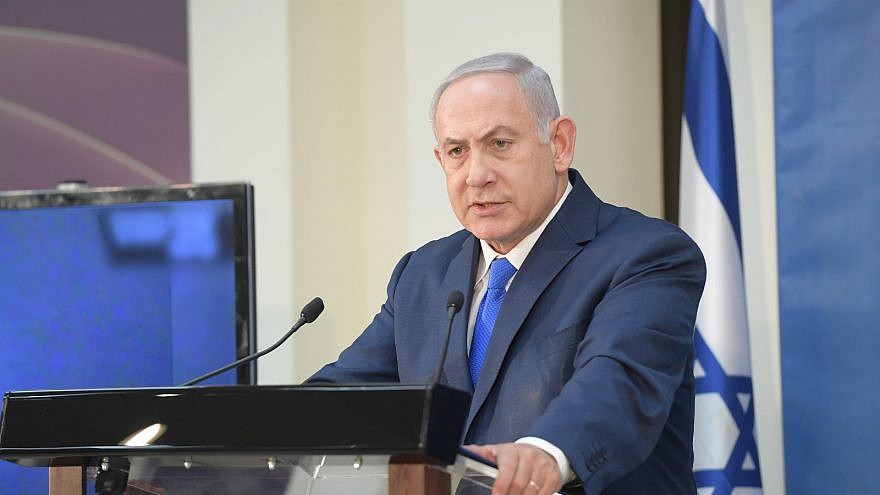For some observers, this past weekend’s revelations about Israeli strikes against Iranian targets in Syria was just politics as usual in the Jewish state. Some pundits treated Israeli Prime Minister Benjamin Netanyahu’s public acknowledgement that the Israel Defense Forces has struck specific Iranian military targets in Syria as an attempt to distract the voters from his personal legal woes in advance of the April elections.
Similarly, there might be those who consider outgoing IDF Chief of Staff Gen. Gadi Eizenkot’s exit interviews with the Israeli and international press in of the same ilk. He, too, spoke about the army’s ongoing duel with Iran’s Quds Force and its Hezbollah auxiliaries in recent years as evidence of his desire to puff up his image before eventually turning (like so many other top officers) to politics.
Notwithstanding Secretary of State Mike Pompeo’s vow last week that America’s goal was to “expel every last Iranian boot from Syria,” with the United States opting out of a direct role in the fight against ISIS there, it remains to be seen how it can accomplish that task or to deter Turkey from slaughtering America’s Kurdish allies with only tough talk.
The United States continues to waver between Pompeo and National Security Advisor John Bolton’s efforts to maintain a strong U.S. policy against Iran and Trump’s neo-isolationist instincts. But Israel remains the one decisive factor that can deter Iranian ambitions.
Israel has been doing the West’s dirty work in Syria dating back to the George W. Bush administration. In 2007, though the Pentagon was aware of and worried about the threat of the Bashar Assad regime developing its own nuclear program, it was Israeli forces that struck and destroyed the Al Kibar reactor site in a raid that not only leveled the facility, but also reportedly killed 10 North Korean nuclear scientists that were working there.
Israel’s role grew even more important after President Barack Obama’s disgraceful backing away from his threat to enforce a “red line” against the Assad regime’s use of chemical weapons against its own people. Obama allowed Russian President Vladimir Putin to take charge in Syria—a decision that facilitated Iranian intervention alongside that of Russia to save Assad’s brutal government, leaving Israel potentially isolated. Even after the United States belatedly joined the war against ISIS, Israel found itself needing to actively hit the Iranian forces in order to prevent them from establishing permanent bases that could gravely threaten its security.
That’s why Israel has been waging a low key yet active war on the Iran’s Quds Force as well as Hezbollah, slamming their facilities with bombs and interdicting efforts to transfer more weapons to Lebanon.
How effective have those efforts been?
To listen to Eizenkot, the answer is that Israel has effectively routed the Iranians. In an interview with New York Times columnist Bret Stephens, the general said that following an Iranian escalation in 2016 (by that point, Iran and its allies had as many as 22,000 troops in Syria), the Israeli government authorized a change in the rules of engagement that led to almost daily attacks by the IDF with more than 2,000 bombs being dropped on 80 separate Iranian and Assad regime targets. Eizenkot seems to think that these attacks have rendered Iran’s Syrian bases a toothless threat, and he takes a similarly dismissive attitude about Hezbollah’s ability to hit the Jewish state from Lebanon.
There’s no doubt that the Iranians have been hit hard by the Israelis and haven’t been able to establish the kind of active military threat that they hoped would be their reward for saving Assad.
But for all of the IDF’s success, the fact remains that the Iranians are still in Syria and could pour far more resources, weapons and troops into the bases they still have there. The same goes for Hezbollah, which may regard the recently discovered terror tunnels they dug under the Israel-Lebanon border as merely a minor aspect of their plans for a new war on the Jewish state should their masters in Tehran choose to launch another round of fighting.
Equally as important, Syria remains a theater of war in which the West is likely to continue to rely on Israel to keep Iran from assuming the kind of military posture that will make good not only on its goal of regional hegemony, but threaten Sunni Arab governments like that of neighboring Jordan. Even if American troops were to stay in Syria, Washington was going to need Israel to keep fighting what Eizenkot has called a “campaign between the wars” in order to maintain a semblance of a balance of power in the region.
Both Netanyahu and Eizenkot may have their own motives for the current round of chest-pounding in the media, but the real story here isn’t the political future of either man. It’s the fact that without Israel acting to keep Iran in line, the situation in the region would be even more dangerous than it already has become.
So the next time you hear about the United States defending Israel, remember that on this strategic front, it has been Israel that is defending the West’s interest in preventing Iran from getting even stronger than Obama and Trump’s blunders have made it.


























